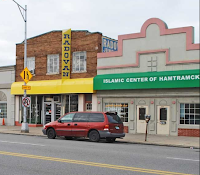Terror Quest, Hamtramck, and Islam
I don’t want any reader get the idea that Terror Quest is in any way “anti-Islam.” After all, the main female character is a Muslim (Najeeba Hallal), and so is the man who does to most in the end to help her (Butrus the Hanbalite), as well as the key figure in the solution to their problem (Ron Sunaru).
Also, the loaded term “anti-Islam” covers a wide variety of behaviors and attitudes. The Pope is “anti-Islam” in the sense that he doesn’t want all Roman Catholics to convert to Islam, because then he would be out of a job. The Crusaders of the Middle Ages were “anti-Islam” in the sense that they wanted to murder all Muslims who opposed them on their march to the Holy Land.
Terror Quest is really about the takeover of authority
by strict fundamentalists instead of the duly elected officials who
should be running the country or state or other political entity. A fanatic
fundamentalist attitude is not, of course, limited to one religion or another. In
the United States, strict fundamentalist Christians have wielded power from the
local school board to the state level to force their vision of “the world as it
should be” on everyone they can. LGBTQ+ people who have trouble finding a
toilet while at school or women who find themselves ceding what they consider
the be their rights to a fetus might struggle, but legitimate authority must be
countered in legitimate ways.
Terror Quest is concerned mainly with power usurped
through illegitimate means, whether by armed revolution or assassination
or, in the case the book, tinkering with voting machines and software.
People faced with an illegitimate usurpation or power are
often moved to revolt (if they succeed, the revolt becomes a revolution). Terror
Quest shows how illegitimate authority can be countered in illegitimate
ways or, as Malcolm X said, “by any means necessary.” At the end of the
book, the revolt is still in the early stages, but shows promised for growing into
a local revolution to reverse the seizure of power by those who do not deserve
it.
No country has a completely homogenous population. Even China,
with a population over 90% Han, has sizeable minorities. The line between
majority rule and minority rights is never completely stable, and as demographics
shift in various ways, the few often become targets for the many who feel
threatened by the change.
It’s only expected that areas with a majority population of
one makeup or another, whether religious or cultural or ethnic, will soon elect
officials that reflect the makeup of the community. And former minorities will
eventually try to take control of their own environment, if only to add a stamp
of legitimacy to their existence and prevent any erosion of their rights by a
threatened but now former majority.
Let me provide an example. My family is concentrated the in
the Northeastern United States, with some of my New York father’s siblings in
Pennsylvania, Illinois, and Michigan. The Michigan branch of the family settled
in Detroit, or, actually, the city of Hamtramck, an entity completely within
the expanding city of Detroit. (One of the joys of having relatives in
Hamtramck is that you know how to pronounce it.)
Anyway, the largely Catholic Polish population has, in the
last 20 or 30 years, but slowly displaced by an influx of immigrants from the
Middle East and other parts of the world. The newcomers are almost exclusively
Muslim, and tensions led many of the former majority to move if they could.
The point is not so much that change is challenging—add “all”
to “change” and you get most of “challenge”—but that change is feared by many,
and rapid change often provokes not just fear but hatred.
So, it should come as no surprise that the local government
of Hamtramck is now entirely consists of elected Muslim officials. Could a
state like Ohio see the same in the future? Why not?
You can read more about the Hamtramck Michigan's “all Muslim”
government here.
This kind of “takeover” is not a disaster, but is a
prerequisite for the kind of power grab that occurs before the opening pages of
Terror Quest takes place. The duly elected Muslim officials have been illegally
displaced by hardliner fundamentalists who are always seeking more and more
power. Their opponents are of the same religion, not a different one. Najeeba walks
by the same mosque at the end of the book as she does at the start. But nevertheless,
much has changed.
If you read the book, please keep this perspective in mind.



Comments
Post a Comment